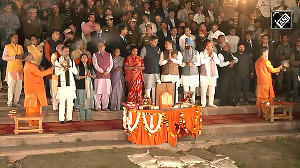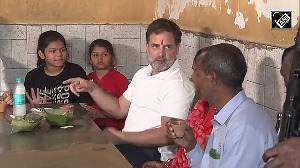 Andhra Pradesh sets up centres to provide legal help to the poor caught in land disputes; the model may be replicated in other states, says Sreelatha Menon.
Andhra Pradesh sets up centres to provide legal help to the poor caught in land disputes; the model may be replicated in other states, says Sreelatha Menon.
There are those who have land and those who don't. Among those who have land, there are those who have title deeds for their land and those who have been assigned land by the government but are yet to get the title deeds.
Then, there are those who have got the title deeds but have no clue where their land is. And, there also are those who have been caught in land disputes for generations. Justice in land disputes, as in other matters, is distant and unaffordable.
The Andhra Pradesh government has been generous in distributing land to the landless. About 4.5 million acres have been distributed, but about 25 per cent of this has not reached the beneficiaries, according to government sources.
To remedy this, the state devised a unique solution under a programme called the Indira Kranti Pratham (IKP). It set up land centres in every district and staffed them with lawyers and surveyors - called barefoot lawyers and barefoot surveyors - because they were selected from the villages and trained.
These centres give legal aid to rural citizens to fight cases and helps the parties in dispute find quick solutions at the mandal level. The land surveyors help those who have got the land titles but not the land. There are about 15 such lawyers in every district and about 500 in the entire state. Another 500 people have been trained as surveyors.
These para-legal workers are graduates from villages who undergo a year's training, followed by a foundation training in the district. Later, they go through two more stages of training at the State Rural Development Academy and National Academy of Legal Studies in Hyderabad.
Similarly, the surveyors are selected from polytechnics and go through a two-month training at the Andhra Pradesh Survey Academy and a one-year apprenticeship with the mandal surveyor.
In huge districts like Adilabad, Kumar says there are as many as 38-40 such lawyers and as many surveyors. According to data, 200,000 people have got their land disputes resolved with the help of these centres.
Sunil Kumar, a former functionary of the land access programme of the IKP, cites the case of a tribal woman from Ulnoor in Adilabad who fought a case from 1970 to 1984 to gain possession of a plot of land. After becoming a part of a self-help group formed under IKP, she brought the case at the land centre in 2001. It was resolved in two months, said Kumar.
In another case from the same district, land given to 80 tribal families 40 years ago was claimed by a non-tribal. The case was taken up by the land centre in the district and the families got the land titles in a month.
IKP, run by the Society for Eradication of Rural Poverty in the state, is set to roll out nationally as the National Rural Livelihood Mission.
This should probably bring hope to many poor communities that are regularly cheated out of their lands.









 © 2025
© 2025